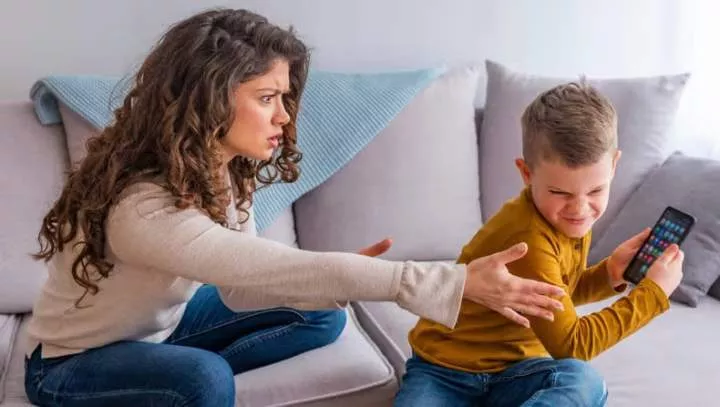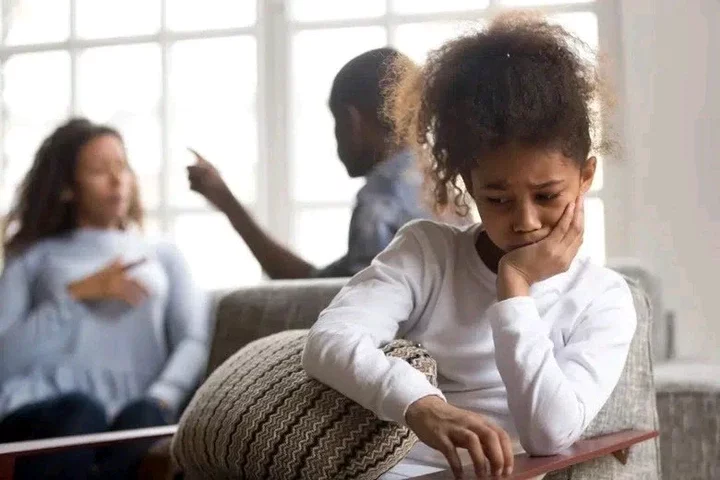![Why children should not be exposed to screens [AmericanPsychologicalAssociation] Why children should not be exposed to screens [AmericanPsychologicalAssociation]](https://static.netnaija.com/i/5PKDoMvyNnM.webp)
The early years are a precious time for building a strong foundation.
In today's digital world, screens are everywhere. Smartphones, tablets, and televisions are constant companions, offering a seemingly endless stream of entertainment.
But for young children, especially those under the age of 5, excessive screen time can have negative consequences.
The downsides of screen time for young children
While educational apps and shows might seem appealing, a growing body of research suggests that excessive screen time can be detrimental to a child's development in several ways:
1. Brain development
The first five years of life are a critical window for brain development. During this time, young children learn best through hands-on experiences, exploring their environment, and interacting with others.

Excessive screen time can disrupt these vital experiences and hinder cognitive development. Studies have shown that too much screen time can be linked to attention problems, delays in language development, and even lower academic performance later on.
2. Social and emotional development
Young children learn important social and emotional skills through face-to-face interactions. They learn to read facial expressions, understand nonverbal cues, and navigate social situations. Screen time can limit these crucial interactions, hindering a child's ability to develop empathy, build healthy relationships, and manage emotions effectively.
3. Sleep problems
The blue light emitted from screens can disrupt a child's sleep cycle. This can lead to difficulty falling asleep, staying asleep, and overall sleep quality.

Chronic sleep deprivation can impact a child's mood, behaviour, and learning ability.
4. Physical development
Young children need plenty of physical activity to develop strong muscles, coordination, and healthy motor skills. Excessive screen time replaces active play, leading to potential problems with obesity, poor coordination, and even vision issues.
5. Obesity risk
Screen time often means less time spent on physical activity. This can contribute to weight gain and childhood obesity.
It's not just about content
Even educational content designed for young children can be problematic. Young minds learn best through hands-on experiences and interactions with real objects. The two-dimensional world of a screen simply can't replicate the richness and complexity of the real world.
Unstructured play allows children to use their imaginations, explore their ideas, and solve problems creatively.
Through play with others, children learn how to take turns, share, cooperate, and resolve conflicts. These social skills are essential for building healthy relationships and thriving in life.
Screen-free play naturally encourages movement and exploration. This is important for developing gross motor skills like running, jumping, and climbing, as well as fine motor skills like using crayons or building with blocks.
Active play helps children release energy, manage stress, and develop a sense of self-confidence. It also provides opportunities for them to express themselves in a healthy way.
Alternatives to screen time
There are countless ways to keep young children engaged and learning without relying on screens. Here are some fun and enriching alternatives:
Give your child ample time for unstructured play, both indoors and outdoors. Provide them with a variety of toys, art supplies, and open-ended materials to spark their imaginations.
Snuggle up with your child and read stories together. This helps in language development, bonding, and a love for reading.

Singing songs, playing interactive games, and engaging in physical activities are all fantastic ways to bond and promote healthy development.
Take your child to the park, the playground, or on nature walks. Let them experience the sights, sounds, and textures of the natural world.
Get creative together with paint, crayons, playdough, or simple household materials.
Encourage interaction with other children through playdates and group activities. These interactions help develop social skills and build friendships.
As a parent, it's completely natural to want to keep your child entertained. But, the best entertainment for young children is real-world exploration and interaction.
Children learn by observing and imitating the adults around them. If you're constantly glued to your phone or computer, your child is likely to follow suit. Be mindful of your own screen time and create a screen-free environment at home.
You could also establish clear rules around screen time. This might involve setting time limits for specific devices or designating certain areas of the house as screen-free zones.
















Comments